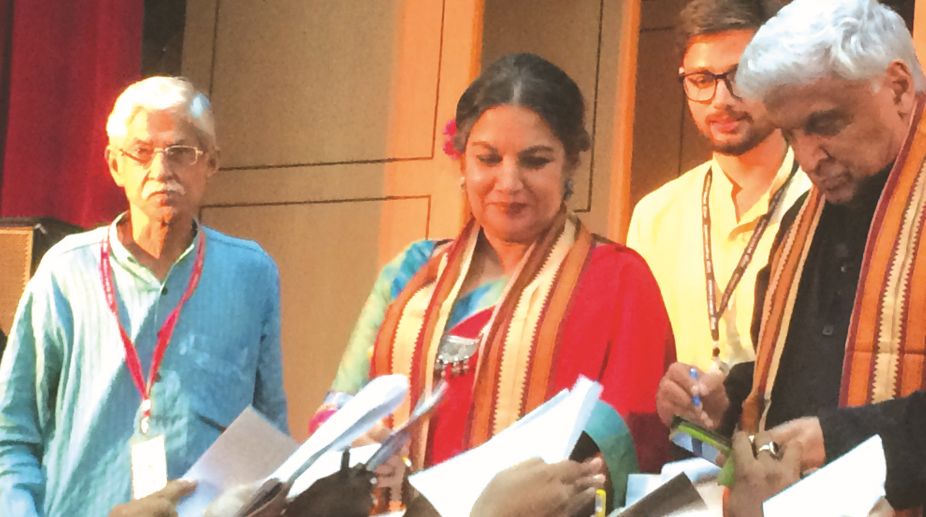Kshitij 2025: The ultimate techno-management fest at IIT Kharagpur
Join Kshitij 2025 at IIT Kharagpur from January 17-19 for Asia's largest techno-management fest, featuring exciting competitions, workshops with industry leaders, and more.
The 6th International Convention of SPIC MACAY saw a week-long scintillating presentation of classical music and dance. A round-up by Manjari Sinha

The 6th International Convention of the Society for Promotion of Indian Classical Music and Culture Amongst Youth (SPIC MACAY or SM) held at the IIT Kharagpur on 3-9 June, was heralded by an inspiring inaugural speech by Prof Partha Pratim Chakrabarti, the present Director of IIT Kharagpur. It was here that SM, the dynamic endeavour of Kiran Seth, was born in 1970s, when he was a student at this very IIT. Praising this cultural movement that transforms the youth with the rich diversity of Indian culture, Prof Chakrabarti welcomed the 1,500 delegates from different parts of India and abroad.
The week-long enriching treat comprised Indian classical music and dance concerts by leading exponents of folk arts, theatre performance, interactions, classic film screening, heritage walks, intensive (workshops) of classical and folk arts and crafts, various kinds of Yoga and other activities. Apart from the afternoon and evening concerts being open to all, the concluding day had an overnight concert from dusk to dawn.
Advertisement
The annual Intcon opened with an invocation by the brilliant students of Pt Ajoy Chakraborty from Shrutinandan, the auspicious Nadaswaram by Vidwan Sheshampatti Sivalingam and Sattriya by Guru Ghanakant Bora and his gifted disciples. The traditional opening of Sattriya orchestra with Guru Khat had Guru Ghanakanta Bora playing the Khol and dancing accompanied on Bortala by his senior disciple Hari Saikia. It was followed by Bandana, Randani and Geetornach by Anwesha Mohanta, concluding with Hari-Hara Leela, based on the devotional composition of Shrimanta Shankar Deva. Anwesha, the SNA Bismillah Khan Yuva Puraskar Awardee Sattriya dancer, impressed with her remarkable sense of rhythm and graceful movements.
Advertisement
The scintillating Bharatanatyam performance by the Yatha Naam-Tatha Roop, Priyadarshini Govind, the delicate dancer of the Vazhuvoor style, stole the show. Opening with an invocation to Kartikeya, composed by Madurai Mani Iyer in raga Shanmukhapriya, she thoughtfully interspersed it with the Kartikeya Kauthuvam. The compassionate and awe-inspiring aspects of Devi next, in a Ragamalika/Tala-malika composition by Rajkumar Bharathi, left the audience in a trance with the shloka “Roopam dehi…Dwisho jahi”, invoking the dancer turned Devi. The Tulasi Bhajans “Thumak chalat Ramchandra…”, “Kahan ke pathik…” and the Telugu Javali offered a mesmerising fare before Priyadarshini concluded her captivating concert with the Tillana. The superb support of the live orchestra enhanced the beauty of the mesmerising performance.
Karnabharam, the classic Sanskrit play written by Bhasa, came alive in the larger-than-life performance of Koodiyattam, the oldest living tradition of Sanskrit theatre from Kerala, hailed by the Unesco as one of the intangible world heritage, by Margi Madhu and the talented troupe of gifted artistes. It was a delight to watch the jam-packed Kalidas Auditorium with young Rasikas, enjoying the extremely slow-moving pace of this classical art form with bated breath in pin-drop silence. There were of course two screens very thoughtfully placed on either side of the stage, to keep translating the Sanskrit dialogues and the sequence of the events, so that the young spectators could keep track of the story.
The intensives of various music and dance styles had some reputed artistes initiating the young students in the art form of their choice. Malavika Mitra was teaching Kathak, Vasanthalakshmi Rasimhachari was teaching Kuchipudi, Sharmila Biswas (Odissi), Kalamandalam Amaljith (Kathakali), Guru Ghanakanta Bora (Sattriya), Uma Sathyanarayana (Bharatanatyam), Neena Prasad (Mohiniyattam), Margi Madhu (Koodiyattam) and dancers from Mayur Art Centre were teaching Mayurbhanj Chhau. It was amazing to see the enthusiasm of the students and the patience of the Gurus in teaching each and every child individually.
The inaugural evening opened with a mesmerising Violin recital by N Rajam followed by a Ghatam-Kanjira-Morchhang ensemble of Vidwan Vikku Vinayak Ram, Selva, Ganesh, Swaminathan and A Ganeshan. The following evenings had Hindustani Vocal concerts by Begum Parveen Sultana and Vidushi Ashwini Bhide; Carnatic vocal by Vidwan T V Shankar Narayan; Mohan Veena by Pt Vishwa Mohan Bhatt; Sitar by Ud Shahid Parvez; and Chitra Veena by N Ravi Kiran. The afternoon concerts offered devotional music in Qawwali by Sarfaraz Iqbal Chishti Brothers, Gurubani by Bhai Baljeet Singh Namdhari, who was equally sublime in both the vocal and instrumental (Taar Shehnai) renditions, and Shyam Sundar Baul.
The other memorable afternoon sessions were the theatrical presentation, Kaifi aur Main, by Shabana Azmi and Jaaved Akhtar, a talk by Anjolie Ela Menon and the classic film Gandhi by Richard Attenborough. The concluding overnight treat offered memorable concerts by stalwarts like Pt Ulhas Kashalkar, Vidushi Shruti Sadolikar, Pt Ajoy Chakraborty, Kumar Mardur concluding with Dhrupad by Ud Wasifuddin Dagar.
Advertisement